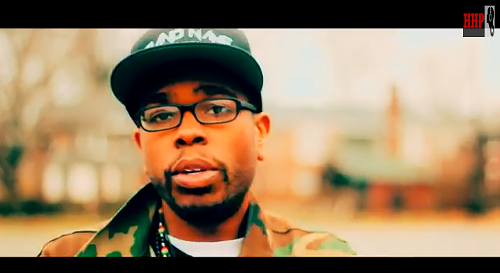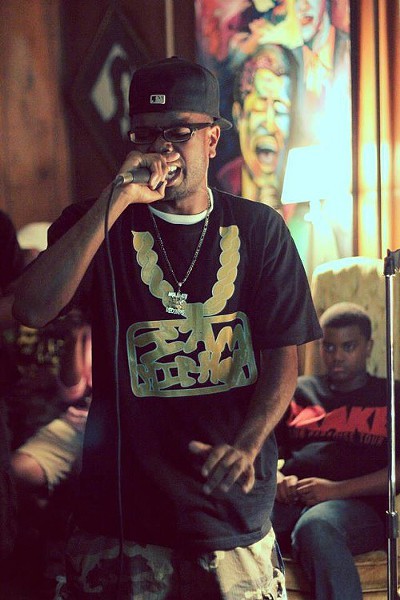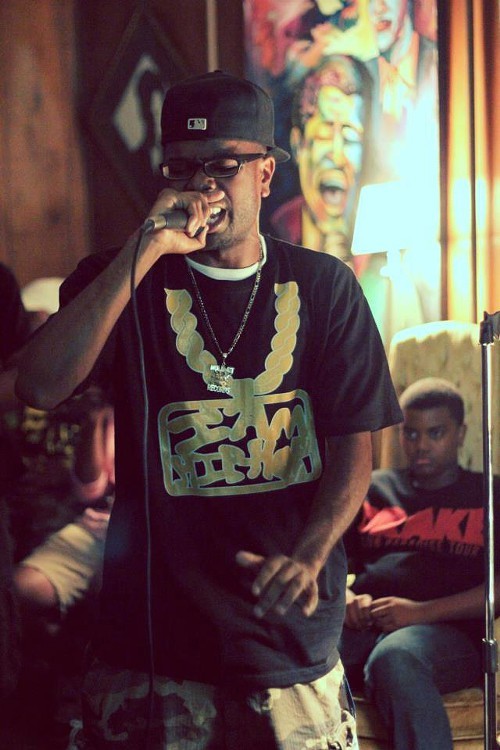If you don’t know what you’re looking for, you can walk right past the average-looking Memphis house with the nondescript white garage that houses Section 9 Studios. One recent Saturday night, a group of hip hop heads gathered there to hear a sneak preview of a record called The New Memphis. Like the studio where he recorded, Knowledge Nick is one of Memphis’ hidden musical gems. But if he has his way, he won’t stay hidden for much longer.
Beginning with 2009’s The Enlightenment, Knowledge Nick has recorded and released three albums of smart, fun hip hop that has garnered him a following in the Memphis underground. But as the seven tracks of The New Memphis played out, the reverent silence in the room made it clear that this is a major artistic breakthrough for the slight 25 year old who one attendee says looks like “Spike Lee’s nerdy little brother.” From the opening slap of “Boom Bap Memphis Rap” to the blissed out coda of “Listen To This,” there’s not a loop out of place, not a rhyme wasted. But to Nick, this is not just a record. It’s the tip of the spear of something bigger.
“When people view Memphis from the outside looking in, they think it’s one crunk sound: Yo Gotti, MJG, Three 6 Mafia, all of them,” Nick says. “Everything has its place, but the idea behind The New Memphis is to show that there’s another alternative out here as well. There are progressive artists here who deserve recognition.”
When he says things like, “We want people to know that there’s an alternative to what’s on the radio,” he echoes the animating spirit behind so much of the great music of the 1980s and ’90s. Indeed, 21st century hip hop has found itself in a similar place to where rock-and-roll was in the ’80s: An insurgent cultural force turned into the dominant paradigm, only to lose its way in a forest of bland, vapid soundalikes. For rock-and-roll, it was arena rock and hair metal. For hip hop, it’s stadium acts and gangsta rap. It’s appropriate, then, that Knowledge Nick takes his inspiration from acts like Public Enemy, Wu Tang Clan, KRS-One, and A Tribe Called Quest, who sprang from hip hop’s creative golden age of the late ’80s/early ’90s. “You not only heard different styles, but people were coming from diverse backgrounds.” Nick says. “And all of them thrived.”
The New Memphis song “The Lost Tribe Of Hip Hop” is about paying tribute to the masters who broke artistic ground before the music lost its soul to money. Nick says that the song began with a visit to Paragon’s studio to hear some new beats the producer was working on. “I am very inspired by production,” he says. “‘Lost Tribe of Hip Hop’ was the name of the beat. I just took that and ran with it. That was one of my favorite songs on the record. I think if you’re an artist, especially if you’re a hip hop artist, you have to know where you come from to know where you’re going.”
But hip hop’s memory is short, Nick says. “People know who Jay-Z is, people know who Tupac and Biggie are, but they don’t know who Kool Herc, Afrikka Bambatta, and Grandmaster Flash and the Furious Five are. People look at what makes money. People will say, ‘Well, Jay-Z has his money.’ You don’t have to have his kind of materialistic status to have artistic stature, in my opinion.”
Nick says that the pressure for MCs to fit into the larger narrative that the labels are building is suffocating. If you don’t have a story from the streets, you make one up in the hopes of being rewarded with airplay. “If that person’s soul is not present, he will take what the label says and completely flip the script and create a character that is completely not who he is, just to make money. I think that’s the sad part of hip hop. Everything has to have a soul connection. When I listen to Common or Gang Starr, I hear the sincerity in it. There are a few cats who are like that now, but as a whole, it seems like cats just have to talk about this materialistic lifestyle. But they don’t own a damn thing. It doesn’t register. It doesn’t make sense to me.”
Part of the messianic impulse behind The New Memphis grew from a well-publicized confrontation with the police last fall. As one South Main Trolley Night wound down, the musicians who line the street of the arts district were packing it in, but Nick and a group of his friends were still going strong. “I remember us just cyphering,” Nick says. But the police heavy handedly swooped in to break up a group of black youths on the street, and when the police ordered them to stop filming with their smartphones, tensions boiled over. “It was legal for us to be doing that,” Nick says, a point that he pressed over the next few weeks with a social media campaign and a series of protests that eventually led to the police adopting formal guidelines protecting the rights of citizens to record their actions on the street. “I felt like that was a win. It’s about pushing accountability,” Nick says. “I understand that police have a stressful job, and there are a few bad apples out here. But we were people who were abiding by the law, and we should be treated as such.”
Nick says the incident became a turning point in his life. “It taught me leadership,” he says. “It showed me that, if you want to see change, you just keep pushing, keep pushing, keep pushing. Know your rights, and stand up for your rights, then more and more people will follow.”
His new confidence brought with it an incredibly fertile creative period. The follow up to The New Memphis is already recorded. “I was about halfway through the EP when I said, ‘You know what? I’m just going to do an album.'” The EP, due out next year, is called The Diary of Knowledge Nick. “A diary is a place where you put your most intimate thoughts. The album changed me, it took me places as a man, and as an artist, too. I’m not used to being vulnerable around people. But I finished the album before finishing the EP.”
The world will have to wait until next year to hear his confessions, but for now, Knowledge Nick and his collaborators in The New Memphis have given us plenty to chew on. “I want to make music that will register with people’s soul, and effects them to change.”


 Dustin Taylor/Sideways Media
Dustin Taylor/Sideways Media 